In recent years, the wellness and health industries have witnessed a significant surge in the popularity of CBD, or cannabidiol. Extracted from the cannabis plant, CBD has rapidly made its way into a variety of products, from oils and tinctures to skincare and edibles. Its widespread acclaim isn't just a result of clever marketing; numerous studies and anecdotal evidence suggest potential health benefits, making it a sought-after alternative remedy for various ailments.
But as with any substance that gains rapid attention, it's crucial for consumers to be well-informed. Understanding how CBD interacts with our brain is not only fascinating but also essential. This knowledge ensures that individuals can make educated choices about their health, recognizing both the potential benefits and the limitations of CBD. In this article, we'll delve deep into the science behind CBD's effects on the brain, shedding light on what's currently known and what future research might unveil.
What is CBD?

CBD, or cannabidiol, is one of over a hundred compounds known as cannabinoids found in the cannabis plant. Originating from both the marijuana and hemp varieties of cannabis, CBD has garnered significant attention due to its potential therapeutic benefits, ranging from pain relief to anxiety reduction. Unlike the more commonly recognized compound THC (tetrahydrocannabinol), CBD does not produce a "high" or the typical psychoactive effects associated with marijuana use.
The primary distinction between CBD and THC lies in their effects on the human brain. While THC binds directly to the brain's cannabinoid receptors, producing euphoric sensations and altered perceptions, CBD affects and operates differently.
It doesn't bind directly to these cannabinoid receptors, which means it doesn't induce the intoxicating effects for which THC is known. Instead, CBD's potential health benefits are believed to stem from its interaction with other systems in the body and brain health, a topic we'll explore further in this article.
In understanding the world of cannabinoids, it's essential to recognize that while CBD and THC are the most well-known, they are just two members of a vast and complex family, each with its own unique properties and effects.
The Endocannabinoid System (ECS)
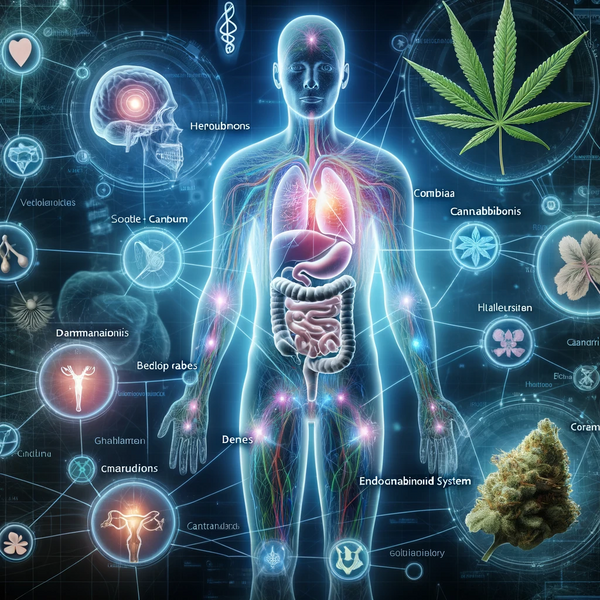
The endocannabinoid system (ECS) is a complex and intricate system present in our bodies, playing a pivotal role in maintaining homeostasis, which refers to the balanced and stable internal conditions essential for optimal health. This system is made up of receptors, enzymes, and endogenous cannabinoids (endocannabinoids) that all work together to control many bodily functions. These include pain sensation, mood regulation, appetite, memory, and more.
While the name "endocannabinoid" might suggest a direct relation to cannabis, the term actually denotes the cannabinoids that are naturally produced within our bodies. "Endo" is derived from the Greek word "endon," meaning "within" or "internal." These endocannabinoids function as neurotransmitters, sending messages between cells to guide various functions. The two primary endocannabinoids identified to date are anandamide (AEA) and 2-arachidonoylglycerol (2-AG).
What's fascinating is that the ECS wasn't discovered until the late 20th century, during research into the effects of cannabis on the body. Scientists found that while plant-derived cannabinoids (like CBD and THC) could influence the ECS, our bodies were already equipped with their own natural cannabinoids. In essence, the cannabis plant's cannabinoids can interact with our ECS, augmenting or influencing its natural functions.
Understanding the ECS provides valuable insights into why and how compounds like CBD might offer therapeutic benefits. CBD and other cannabinoids may be able to change and affect many physiological responses by interacting with this system. This is thought to have many health benefits.
CBD and the Brain's Receptors
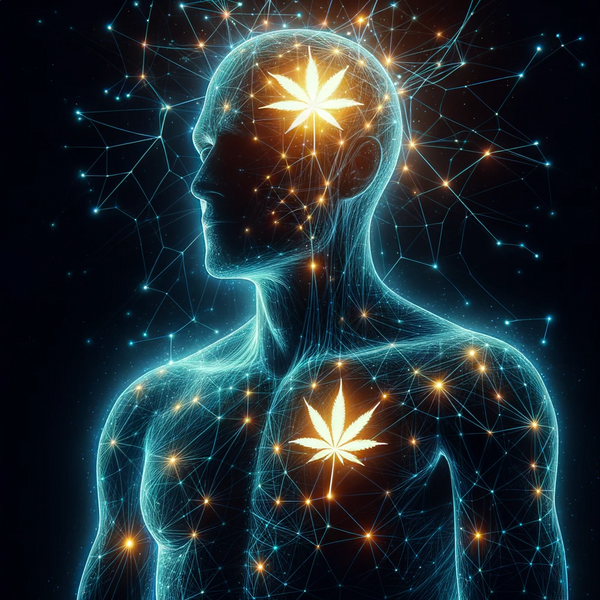
At the heart of the Endocannabinoid System (ECS) lie its receptors, primarily the CB1 and CB2 receptors. These receptors are found throughout the body but are most densely populated in the brain (CB1) and the immune system (CB2). They play a critical role in receiving and translating signals from cannabinoids, whether they're endogenously produced by our bodies or introduced from external sources like the cannabis plant.
- CB1 Receptors: Predominantly located in the brain, CB1 receptors are involved in various neurological processes, including mood, appetite, memory, and pain relief or sensation. When THC, the primary psychoactive compound in marijuana, enters the body, it binds directly to these CB1 receptors. This direct binding is what produces the characteristic "high" or euphoric sensation associated with marijuana consumption.
- CB2 Receptors: CB2 receptors are more abundant outside the central nervous system, especially in immune cells. They're involved in regulating inflammation and immune responses. When activated, they can help reduce inflammation, which is why cannabinoids are being researched for their potential anti-inflammatory benefits.
Now, when it comes to CBD, its interaction with these receptors is more nuanced. Unlike THC, CBD oil doesn't bind directly to CB1 or CB2 receptors. Instead, it acts as a modulator, influencing how these receptors communicate with other compounds. By doing so, CBD can enhance or inhibit the effects of other cannabinoids. For instance, CBD can mitigate the psychoactive effects of THC by interfering with its ability to bind to CB1 receptors.
This indirect method of influencing CB1 and CB2 receptors is what makes CBD acts unique and contributes to its non-intoxicating nature. It's also why CBD is believed to have a broad range of potential therapeutic applications. CBD can change many bodily functions without changing your mind, like THC does, because it modifies the ECS without directly binding to its receptors.
The Serotonin System
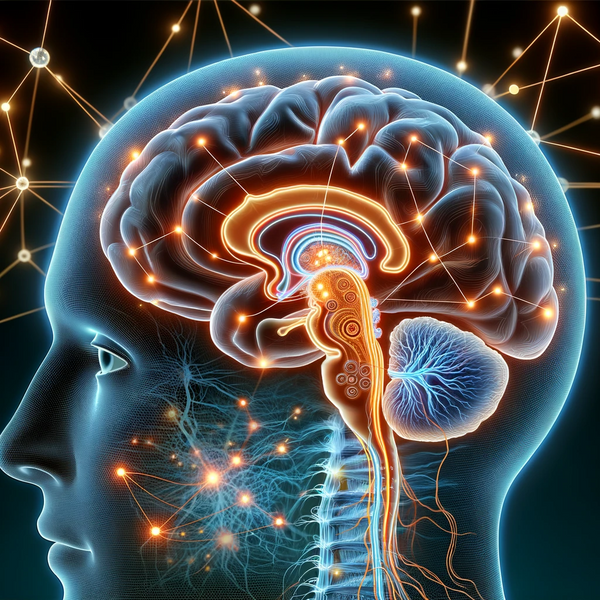
Serotonin, often dubbed the "feel-good" neurotransmitter, plays a pivotal role in our brain's complex chemistry. This neurotransmitter is responsible for regulating a host of physiological processes, from mood and emotion to sleep and digestion. An imbalance in serotonin levels is frequently linked to mood disorders, including depression and anxiety, making the serotonin system a focal point for many mental health treatments.
Role in Mood and Behavior:
At its core, the serotonin system serves as a crucial regulator of mood and behavior. High levels of serotonin are typically associated with feelings of well-being and happiness, while decreased levels can lead to mood swings, feelings of sadness, and other emotional disturbances. Furthermore, serotonin influences our sleep-wake cycle, appetite, and even our social behavior, emphasizing its overarching significance in our daily lives.
Reduces the level of brain cell excitation The probability that brain cells will fire is known as brain excitability, and it varies from person to person. Nevertheless, excessive stimulation may result in excitotoxicity, or brain cell damage.
How CBD Can Influence Serotonin Receptors:
Recent research suggests that CBD can have a direct impact on the serotonin system. While CBD doesn't necessarily boost serotonin levels, it appears to affect how the brain's chemical receptors respond to the serotonin already present in the system. Specifically, CBD may bind to and activate the serotonin 5-HT1A receptor, which plays a role in anxiety and mood disorders.
The potential influence of CBD on these receptors could explain its purported benefits in managing conditions like anxiety, depression, and even PTSD. CBD may be a natural alternative to or addition to traditional serotonin-targeting drugs like SSRIs (selective serotonin reuptake inhibitors) because it changes the serotonin system.
However, it's essential to approach these findings with cautious optimism. While preliminary research is promising, more extensive clinical trials are required to fully understand CBD's effects on the serotonin system and its implications for mental health conditions.
Neuroprotective Properties of CBD
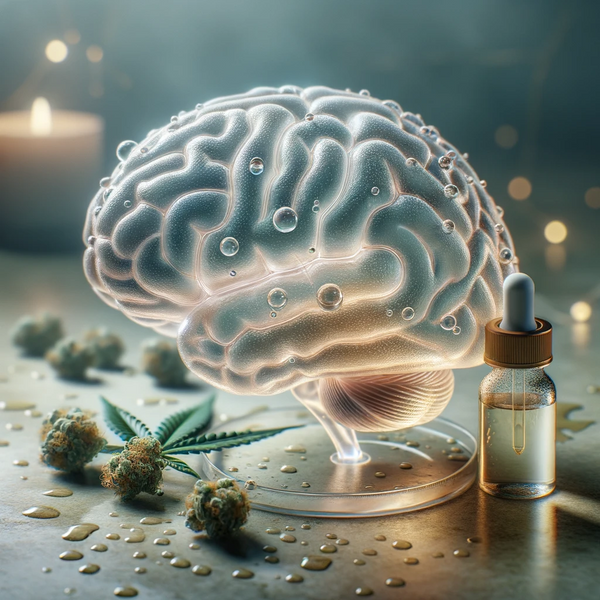
One of the most promising and extensively researched areas of CBD's potential therapeutic applications lies in its neuroprotective properties. As our understanding of the nervous system and brain health continues to expand, the quest for substances that can protect nerve cells from damage is of paramount importance, especially in the face of neurodegenerative diseases.
Based on the research, it was found that CBD may help protect nerve cells from different types of brain tissue damage. These studies were done both in vitro (without living things) and in vivo (with living things).
For instance, research has shown that CBD can reduce oxidative stress in neurons, a process that can lead to cell damage and has been implicated in various neurodegenerative conditions. Additionally, CBD's anti-inflammatory properties can help mitigate inflammation in the brain, which is another key factor in neuronal damage.
Potential Benefits for Neurodegenerative Diseases:
Given its neuroprotective properties, CBD oil has been the subject of investigation for its potential benefits in treating neurodegenerative diseases, including:
- Alzheimer's Disease: Early research suggests that CBD might help reduce the progression of alzheimer's disease by preventing the neuroinflammatory response that characterizes this debilitating condition.
- Parkinson's Disease: Some studies indicate that CBD may offer symptomatic relief for Parkinson's patients, particularly in managing pain, sleep disturbances, and psychosis.
- Multiple Sclerosis: CBD's anti-inflammatory properties might play a role in managing the symptoms and progression of multiple sclerosis, especially when combined with THC in specific ratios.
- Amyotrophic Lateral Sclerosis (ALS): Preliminary studies hint at the potential of CBD in slowing the progression of ALS, though more rigorous research is needed.
It's essential to note that while the initial findings are promising, more extensive and robust clinical trials are required to firmly establish CBD's efficacy in treating these conditions. As always, individuals considering CBD for neurodegenerative diseases should consult with healthcare professionals to make informed decisions.
Researchers embarked on a study to explore the impact of cannabidiol (CBD) on cerebral blood flow in specific brain areas associated with memory processing. As a key component of cannabis, CBD is attracting attention for its possible therapeutic benefits.
Preliminary findings suggest that CBD could play a role in alleviating symptoms related to memory disorders. This research is crucial in understanding the broader implications of CBD usage, especially in the context of mental health conditions and cognitive functions.
The investigation aims to shed light on how CBD influences blood pressure, flow and brain activity, potentially opening new avenues for treating conditions that affect memory and cognitive health.
Potential Benefits for Neurodevelopmental Diseases
The study on the effects of Cannabidiol (CBD) on cerebral blood flow extends to the exploration of its potential benefits for neurodevelopmental conditions such as Autism Spectrum Disorder (ASD). Researchers are investigating how CBD's influence on different brain regions involved in memory processing could translate into therapeutic applications for ASD.
There is growing interest in CBD's therapeutic properties, especially in the context of neurodevelopmental disorders. By understanding how CBD affects brain function, scientists hope to uncover new treatment strategies for ASD, which may include the use of CBD oils to manage or alleviate some of the symptoms associated with this condition.
This research represents a significant step forward in understanding the broader potential of CBD oils in the realm of neurodevelopment and mental health.
Impact of Cannabidiol on Brain Connectivity: Insights from CBD Treatment in Mice
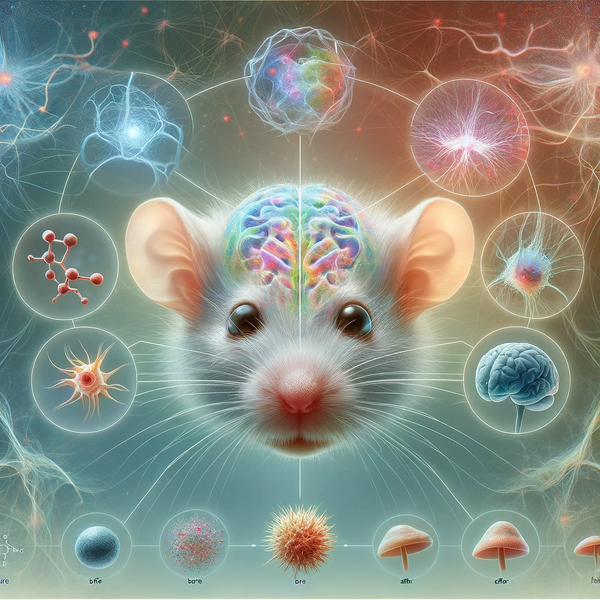
The findings from the study where mice were administered 10 mg/kg of cannabidiol (CBD) prior to imaging are quite revealing. There was a significant differences in coupling across various regions of the brain, specifically in the hindbrain areas, midbrain, hypothalamus, and cortex. This suggests that CBD has a significant impact on the neural activity in these areas.
However, the study also observed that there were no significant changes in the forebrain regions, particularly in the olfactory system, prefrontal cortex, thalamus, or amygdala. This indicates that CBD's influence on neural coupling might be more pronounced in certain parts of the brain than others.
Interestingly, when focusing on the Ascending Reticular Activating System (ARAS) as a singular node, a similar pattern of uncoupling was observed between the ARAS and these major brain regions. The exception to this pattern was again in the olfactory system and prefrontal cortex.
This finding is particularly significant as it suggests a specific and differential impact of CBD on brain regions, highlighting the complex nature of CBD's effects on the brain's neural networks. This aspect of the research could be crucial for understanding how CBD might be used in therapeutic settings like alzheimer's disease, especially in relation to neurodevelopmental and cognitive disorders.
The Role of CBD in Reducing Inflammation
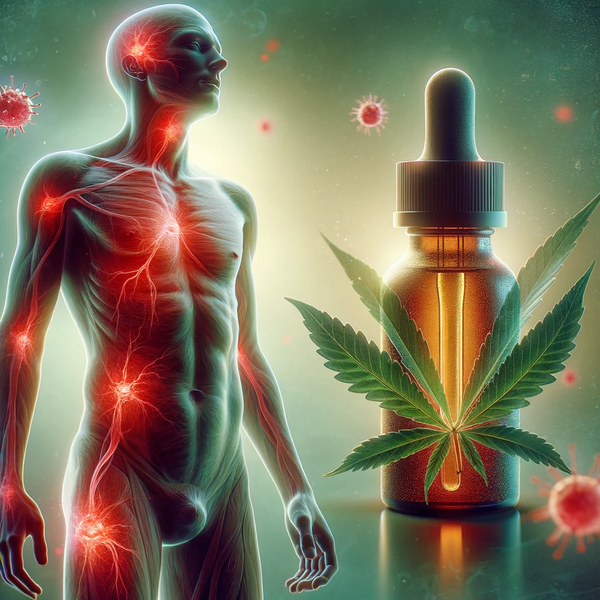
Inflammation is a natural and essential bodily response to injury or harmful stimuli. However, when inflammation becomes chronic or occurs in places where it's not needed, it can lead to various health issues, including many that affect the brain. Understanding the relationship between the brain, inflammation, and diseases is fundamental to recognizing the potential therapeutic value of anti-inflammatory agents like CBD.
The Connection Between the Brain health, Inflammation, and Diseases:
The brain is not immune to the effects of inflammation. In fact, neuroinflammation, or inflammation of the brain tissue, has been linked to a host of neurological and psychiatric disorders, from depression and anxiety to more severe conditions like Alzheimer's and Parkinson's disease. Chronic inflammation in the brain can lead to neuron damage, disrupt neurotransmitter function, and ultimately impact cognitive and emotional well-being.
Possible health advantages of THC and other cannabinoids, such as CBD, may offer the following advantages for brain health: aid in reducing brain inflammation, or neuroinflammation Promote neurogenesis, or the development and protect brain cells. Assist in reducing excitotoxicity, which is the harm that prolonged activation of an excitatory neurotransmitter—most commonly glutamate—causes damaged to brain cells. Cut down on hypothermia.
How CBD Acts as an Anti-Inflammatory Agent:
CBD has shown significant promise as a natural anti-inflammatory substance. Here's how it works:
- Interaction with CB2 Receptors: As mentioned earlier, CB2 receptors are predominantly found outside the nervous system, especially in immune cells. By modulating these receptors, CBD oil affects and can influence the release of cytokines, proteins responsible for mediating inflammation in the body.
- Fatty Acid Amide Hydrolase (FAAH) Suppression: FAAH is an enzyme that breaks down anandamide, a natural cannabinoid in the body. By inhibiting FAAH, CBD indirectly increases anandamide levels, which have anti-inflammatory effects.
- Reduction of Oxidative Stress: Oxidative stress is a significant contributor to inflammation. CBD, with its antioxidant properties, can counteract oxidative damage, further reducing inflammation.
- The potential of CBD to protect brain cells is still being investigated, particularly in those suffering from neurodegenerative conditions like dementia, Parkinson's disease, and Alzheimer's.
Considering the intricate link between inflammation and numerous health issues, CBD's anti-inflammatory properties offer potential therapeutic benefits across a wide spectrum of conditions, not just those confined to the brain. Whether it's managing pain, post traumatic stress disorder, reducing the symptoms of autoimmune disorders, or potentially slowing the progression of neurodegenerative diseases, the anti-inflammatory effects of CBD hold considerable promise.
Potential Side Effects and Considerations

As with any substance introduced to the body, it's essential to approach CBD with an informed and balanced perspective. While numerous studies and anecdotal evidence point to its potential health benefits, CBD is not without its side effects. Recognizing these is crucial for anyone considering their use, especially when it comes to ensuring safety and efficacy.
Potential Side Effects of CBD:
- Brain: While CBD is non-intoxicating, some users have reported feelings of drowsiness, light-headedness, or a slight change in alertness. It's also worth noting that the long-term cognitive effects of CBD remain under-researched.
- Body: Common side effects include dry mouth, changes in appetite, diarrhea, and potential interactions with other medications, leading to altered processing by the liver.
- Mood: Though rare, some individuals might experience mood changes, including increased anxiety disorders or feelings of unease. This emphasizes the importance of starting with a low dose and monitoring one's reactions.
The Importance of Dosage:
CBD's effects can vary significantly based on dosage. While low to moderate doses might offer therapeutic benefits, higher doses could lead to increased side effects. It's essential to start with a low dose, gradually increasing it until the desired effects are achieved, all while monitoring for any potential side effects.
Consultation with Healthcare Professionals:
Before starting CBD or any supplement, consultation with a healthcare professional is paramount. This is especially true for individuals taking prescription medications, as CBD can interact with certain drugs, potentially altering their efficacy or leading to unwanted side effects. A healthcare provider can offer guidance on appropriate dosages, potential interactions, and a more personalized approach to CBD use.
While CBD holds considerable promise in the realm of natural therapeutics, it's not a one-size-fits-all solution. Being well-informed and taking a cautious approach ensures that individuals can harness its benefits while minimizing potential risks.
Conclusion
As we've journeyed through the intricate ways CBD affects and interacts with the brain, one thing becomes abundantly clear: the world of cannabinoids is vast and complex. CBD may have many benefits, some of which are supported by new scientific research.
For example, it may protect brain cells and reduce inflammation by slightly changing the endocannabinoid system. However, as with any substance, it's essential to approach its use with a keen sense of awareness and understanding.
By staying informed and diving deep into the science behind CBD, readers can make educated decisions, ensuring they harness the potential benefits of CBD while being cognizant of its limitations and potential side effects.
Call to Action (CTA)
We Welcome Your Experiences and Questions on CBD: Share Your Stories and Inquiries Below! This invitation encourages individuals to contribute their personal experiences with Cannabidiol (CBD) or pose questions about its effects on the brain.
By sharing in the comments, participants can foster a more knowledgeable and interactive community, enriching the conversation with diverse perspectives and insights. This is a great opportunity for people to learn from each other's experiences and expand their understanding of CBD affects and give impact on neurological health like anxiety disorders.
Additionally, if you found this article enlightening, we encourage you to explore related articles on our site or check out some of the CBD products we recommend. Remember, knowledge is power, and staying updated is the key to making the best choices for your well-being.
We thank you for being part of our community and wish you all the best. Stay safe and healthy!

